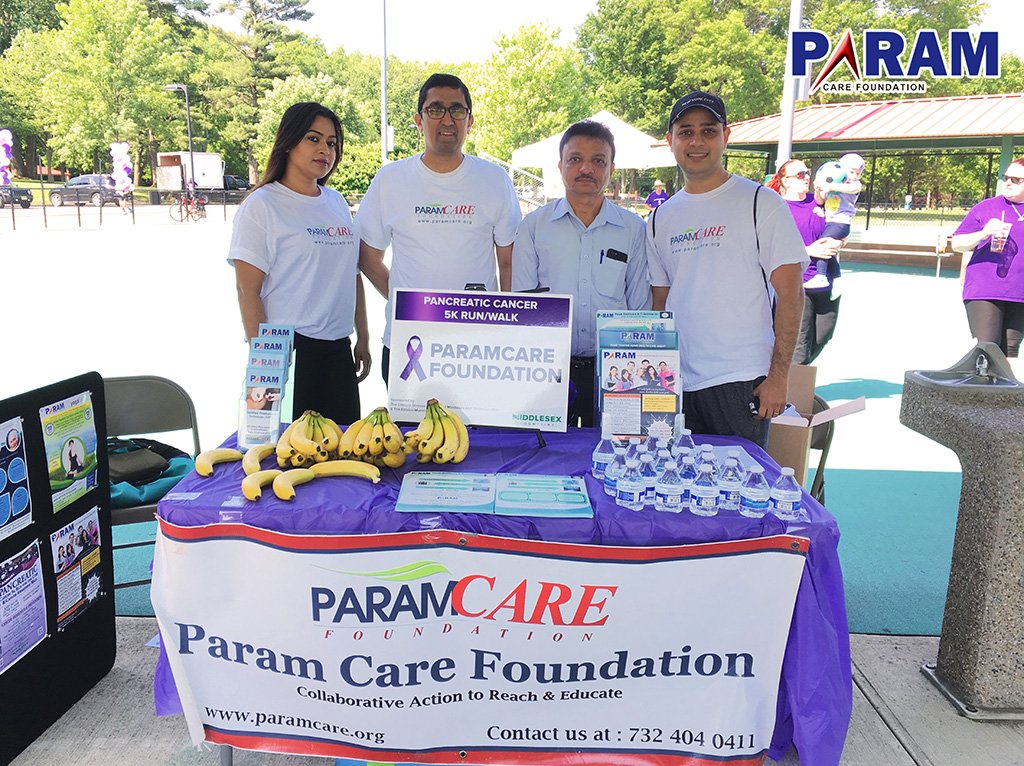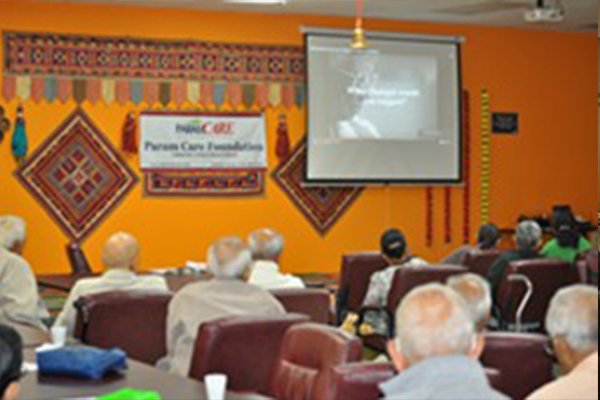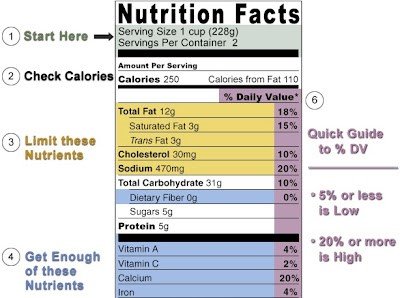
5K Pancreatic Walk
The vision of ParamCARE foundation is to build ‘Healthy America’. Our mission is to work for Communities where all the citizens, irrespective of their background, heritage, socioeconomic status, current state of disease or wellbeing should live healthier, happier, active, longer lives with enhanced cultural and social values for wellness of societies and then by our country.
To enhance the health quality and disease prevention, in communities, we not only outreach the people through our educational & awareness seminars like holistic approach for healthy life style, workshops on cancer awareness and disease prevention, etc., but we also support the similar events conducted by other organizations for the benefits of the society.
ParamCARE Foundation was invited by the Director, Office of Health Services, Middlesex County, NJ for participation and support the 10th Annual 5K Pancreatic Cancer Awareness Walk, on June 09, 2018, in Roosevelt Park, Edison, NJ.
ParamCare Foundation had been gracious enough to have a table to showcase the events, services related to programs. More than 300 people were participated in Cancer Awareness Walk Event.
At the end of an event Mr. Lester Jones, Director-Middlesex County Health Officer, thanked Param Care Foundation for nonstop support for all the activities of the Middlesex County.
Read More
Heart Disease
Heart Disease:
There are many different kinds of heart disease. The most common is atherosclerosis which is the buildup of fatty deposits or plaques in the walls of arteries. As result of plaque formation, there is less space for blood to flow normally during circulation resulting in to less delivery of oxygen throughout the body, including to the heart. Depending on where the buildup is, it can cause a heart attack, leg pain, or a stroke. Atherosclerosis is not part of normal aging and can be serious.
Common Sign & Symptoms of Heart Disease:
Early heart disease may not have symptoms, or early symptoms may not be noticeable particularly in older adults. That’s why regular checkups with are important for diagnosis and prevention.
- Pain in the chest shoulders, arms, neck, jaw, or back
- Shortness of breath when active or at rest
- Chest pain during physical activity that gets better when you rest
- Lightheaded
- Dizzy
- Confusion
- Headaches
- Cold sweats
- Nausea/vomiting
- Easily tired or fatigued
- Swelling in the ankles, feet, legs, stomach, and/or neck
- Less able to exercise or be physically active
- Problems doing your normal activities
Prevention of Heart Disease:
- Don’t smoke
- Stay at a healthy weight
- Avoid spending hours every day sitting
- Exercise
- Keep your diabetes, high blood pressure, and/or high cholesterol under control
- Manage your stress
- Don’t drink a lot of alcohol
- Regular Medical checkup & Tests

Managing Diabetes-Self Management Program
Mission of the ParamCARE Foundation (IRS 501 (c) (3) certified non-profit organization), is to work for an America in which all the citizens, irrespective of their background, heritage, socioeconomic status, current state of disease or wellbeing must live healthier, happier, active and longer lives, with the enhanced cultural and social values for wellness and growth of society and the Nation.
ParamCARE Foundation believes that total health of citizen is the true reflection of the wealth of community, state, and the country. The health of the people can be ensured by removing health disparities and providing the equal opportunity to live in healthy environments, healthy lifestyles, and the quality health care.
To enhance wellness reduce the chronic disease burden we organized “Managing Diabetes-Chronic Disease Self-Management Program” today Dt. 05/19/2018 as a part of our Prevention, Promotion, and Protection of Public Health Seminar & Workshop series, at 200 Middlesex Essex Tpk., Iselin, NJ. Number of people participated in the Program and thanked ParamCARE Foundation for organizing very useful workshop for self-management of diabetes
Read More
Arthritis
Key Facts:
Arthritis is derived from Greek word “Arthro” means joint and ‘Itis’ means inflammation. It is characterized by pain and stiffness of one or more joints, typically worsen with the age.
*The first description of rheumatoid arthritis was mentioned, in 1800, by French Physician Dr. Augustin Jacob Landre-Beuvais in Paris.
*Arthritis is predominantly a disease of old persons but children can also be affected. More than 70% of the individuals of age 65 and above are affected by arthritis.
*Arthritis is more common in women (26%) than in men (19%), according to CDC, out of total number of patients, 60% are women at any age.
*According to the survey of CDC, based on 2010-2012 estimated 52.5 million (22.7%) that is 1 in 5 adults have arthritis.
* About 23% overweight & 31% obese adults have arthritis.
* About 294000 children under the age of 18 years, are suffering from arthritis or rheumatic condition.
*Arthritis is the # 1 cause of disability in USA, about 22.7 million (9.8%) have arthritis or Arthritis Attributable Activity Limitations (AAAL).
*About 20 million individuals have limitations in their daily routine activity on daily basis.
* It is estimated that about $ 100 billion (About 50%) earnings are lost every year.
* About 1 million hospitalization & about 45 million out patient’s visits to health care center visits are due to arthritis or its related complaints.
*As per NHIS projection about 78 million (26%) adults may have doctor diagnosed arthritis by 2040.
*About 35 million (44%) may report for arthritis attributable activity limitations by 2040
Read More
Fall Preventive Exercise Program
ParamCARE Foundation believes that total health of citizen is the true reflection of the wealth of community, state, and the country. The health of the people can be ensured by removing health disparities and providing the equal opportunity to live in healthy environments, healthy lifestyles, and the quality health care.
Mission of the ParamCARE Foundation (IRS 501 (c) (3) certified non-profit organization), is to work for an America in which all the citizens, irrespective of their background, heritage, socioeconomic status, current state of disease or wellbeing must live healthier, happier, active and longer lives, with the enhanced cultural and social values for wellness and growth of society and the Nation.
To enhance wellness fall prevention in older adults and adult with the disability, we organized “Fall Preventive Exercise Program today Dt. 05/05/2018 as a part of our Prevention, Promotion, and Protection of Public Health Seminar & Workshop series, at 200 Middlesex Essex Tpk., Iselin, NJ. Number of people participated in Fall Preventive Exercise Program and also enrolled for follow-up workshop session.
Read More
Prevention of Public Health Seminar
Mission of the ParamCARE Foundation (IRS 501 (c) (3) certified non-profit organization), is to work for an America in which all the citizens, irrespective of their background, heritage, socioeconomic status, current state of disease or wellbeing must live healthier, happier, active and longer lives, with the enhanced cultural and social values for wellness and growth of society and the Nation.
ParamCARE Foundation believes that total health of citizen is the true reflection of the wealth of community, state, and the country. The health of the people can be ensured by removing health disparities and providing the equal opportunity to live in healthy environments, healthy lifestyles, and the quality health care.
To enhance wellness, healthy lifestyle, disease prevention, chronic disease self-management, fall prevention in older adults and adult with the disability, we organized Prevention, Promotion, and Protection of Public Health Seminar series, at 200 Middlesex Essex Tpk., Iselin, NJ. Started from Dt. 04/28/2018
Number of people participated in an event and enrolled for follow-up workshop session series for Fall Preventive Exercise Program and Chronic Disease Self-Management Program.
Read More
Nutrition Glossary
Nutrition is about eating a healthy and balanced diet. Food and drink provide the energy and nutrients you need to be healthy. Understanding the following nutrition terms may make it easier for you to make better food choices.
Calories: In a nutritional context, the kilojoule (kJ) is the SI unit of food energy provided by energy-containing nutrients of food-carbohydrates, fats, proteins
Carbohydrate:
A sugar or starch such as pasta, bread, fruits. Vegetables, beans, or dairy that the body uses as its main energy source. Carbohydrates have 4 calories a gram.
Cholesterol:
Vital for building hormones and cell membranes. Cholesterol is listed under the fat information on a nutrition label. Person should consume less than 300 mg of cholesterol daily.
Daily value:
The percentage of a certain nutrient in a food, based on a 2,000-calorie diet. It suggest a food’s nutrient contribution in diet; 5% or less is considered low for that nutrient, 10% to 19% is good, and 20% or more is high.
Dietary fiber:
The part of plant foods: Whole grains, fruits, vegetables, nuts, and seeds contain fiber. Fibers are not digested by body. It helps to lower cholesterol.t least 25 to 38 grams daily.
Enriched:
Nutrients added to replace those lost during food processing. For example, B vitamins are lost when wheat is processed into white flour, so these nutrients are later added back.
Fortified:
Fortified foods have nutrients added to them that weren’t there originally. Milk, for example, is fortified with vitamin D, a nutrient that helps you absorb milk’s calcium.
High-Fructose Corn Syrup (HFCS):
A sweetener that is often used instead of sugar in food manufacturing. Hydrogenated. Hydrogenation turns a liquid fat such as vegetable oil into a semi-solid, more shelf-stable fat, such as margarine. Most oils are only partially hydrogenated, which creates harmful Trans fats that can raise cholesterol.
Lecithin:
Added to chocolates, baking products, cosmetics, lecithin is used as a thinner, preservative, or an emulsifier. Egg yolks, soy beans, fish, and other foods naturally contain lecithin.
Vegetables:
get the nutrients needs by eating a variety of color vegetables. Try colorful fresh & seasonal vegetables. Two and half cups are needed in a day.
Grains:
Your body quickest energy source comes from grains products. Like bread, pasta, oatmeal, cereals, and tortillas. It is always healthy to use Whole-grain foods like whole-wheat bread and brown rice. Daily requirement for grains is about six Ounces.
Protein:
Protein is essential for building and repairing muscle. Quality protein sources comes from plant based foods. Beans, peas (Kidney, pinto, white or black beans), spilt peas (Chickpeas), Soya products, unsalted nuts and seeds like almonds. Use about Five Ounces a day.
Dairy:
Foods like fat -free and low-fat milk, cheese, paneer, Yogurt, and fortified soymilk help to build and maintain strong bones. Preference should be given to cow and goat milk made dairy products. Daily requirement is about three cups.
Read More
Skin Cancer Awareness & Screening Event
The vision of ParamCARE foundation is to work for healthy America in which all the citizens, irrespective of their background, heritage, socioeconomic status, should live healthier, happier, active, longer lives with enhanced cultural and social values for wellness of societies and our country.
To enhance the improving the quality of life of all needy individuals and disease prevention in communities, we promote strategies and activities to raise healthcare education and awareness on health maintenance and disease prevention, in a culturally sensitive manner. we not only outreach the people through healthcare educational & awareness seminars like holistic approach for healthy life style, workshops on cancer awareness and disease prevention, etc., but we also support the similar events conducted by other organizations for the benefits of the society. We believe that by creating healthy behavior among the population through social learning, people shall get closer to build a healthier community and the country.
ParamCARE Foundation was invited by the Mayor and Health Educator of Woodbridge Division of Health & Human Services, to provide Skin Cancer Awareness & Screening, on Woodbridge Township Public Health Day. The event was took place at Woodbridge Township Public Health Center, 2 George Fredrick Plaza, Woodbridge, NJ. On April 07, 2018. Number of participants inquired about the skin cancer and took the advantage of our screening services.
Read More
Triglycerides
What Are Triglycerides?
Triglycerides are a type of fat also known as “lipids in blood. Triglyceride is an ester derived from glycerol and three fatty acids (from tri- and glyceride). Triglycerides are the main constituents of body fat in humans and other animals, as well as vegetable fat They are also present in the blood to enable the bidirectional transference of adipose fat and blood glucose from the liver, and are a major component of human skin oils Body converts extra calories especially from food such as pastries white bread, candy, sugar, oil, margarine, butter and alcohol into triglycerides and stores them in fat cells. Triglycerides play an important role in metabolism as energy sources and transporters of dietary fat. They contain more than double energy (approximately 9 kcal/g or 38 kJ/g) as carbohydrates (approximately 4 kcal/g or 17 kJ/g)
In the human body high levels of triglycerides have been linked to atherosclerosis, risk of heart disease and stroke. However, the relative negative impact of raised levels of triglycerides compared to that of LDL: HDL ratios is as yet unknown. The risk can be partly accounted for by a strong inverse relationship between triglyceride level and HDL-cholesterol level.
Triglycerides & Cholesterol are known as lipids but only triglycerides are fats. Cholesterol is a waxy substance made by liver and intestines that helps make cell membranes and hormones. It also helps body to digest food. Body uses them to transfer and store energy for later use. But higher level of bad LDL) cholesterol can raise risk of heart disease.
The levels of good (HDL) cholesterol bad (LDL) cholesterol and triglycerides in blood can be measured by Blood Test known as Lipid Profile. Desirable: Less than 150 mg/dL (1.7 mmol/L)
Borderline high: 150 to 199 mg/dL (1.7-2.2 mmol/L) High: 200 to 499 mg/dL (2.3-5.6 mmol/L)
Very high: 500 mg/dL or greater (5.6 mmol/L)
These levels are tested after fasting 8 to 12 hours. Triglyceride levels remain temporarily higher for a period after eating.
The American Heart Association recommends an optimal triglyceride level of 100 mg/dL (1.1 mmol/L) or lower to improve heart health.
For people with mildly or moderately high levels of triglycerides lifestyle changes including weight loss, exercise moderate exercise and dietary modification are recommended. This may include restriction of carbohydrates (specifically fructose) and fat in the diet and the consumption of omega-3 fatty acids from algae, nuts, and seeds. The decision to treat hypertriglyceridemia with medication depends on the levels and on the presence of other risk factors for cardiovascular disease.
Read More
About Post Author
Follow Me